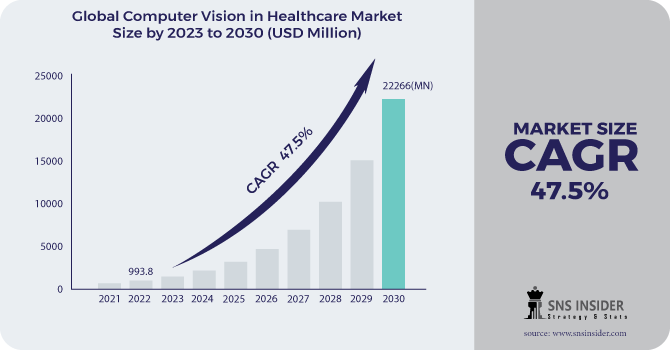The global Computer Vision in Healthcare size projected to leap from USD 1.46 billion in 2023 to an astounding USD 33.32 billion by 2031. This remarkable expansion, reflecting a compound annual growth rate (CAGR) of 47.8% over the forecast period from 2024 to 2031, underscores the transformative impact of advanced computer vision technologies in the healthcare industry.

The surge in market size is driven by several key factors. The integration of artificial intelligence (AI) and machine learning (ML) with computer vision technologies has revolutionized diagnostic procedures, patient monitoring, and treatment methodologies, leading to improved patient outcomes and operational efficiencies. The increasing adoption of computer vision applications in medical imaging, surgery, and telemedicine is set to further propel market growth.
Revolutionizing Healthcare with Computer Vision
Computer vision, a branch of AI that enables machines to interpret and process visual data, has emerged as a critical technology in modern healthcare. Its applications span across various domains including radiology, pathology, and ophthalmology, offering unprecedented accuracy and speed in diagnostics.
In radiology, computer vision algorithms enhance the accuracy of image interpretation, aiding in the early detection of diseases such as cancer. In pathology, these technologies facilitate automated analysis of tissue samples, significantly reducing the time required for diagnosis. Ophthalmology has also seen transformative changes, with computer vision systems enabling early detection of eye diseases through detailed retinal scans.
Get a Free Sample Report : https://www.snsinsider.com/sample-request/2087
Market Dynamics and Key Drivers
The explosive growth of the Computer Vision in Healthcare market can be attributed to several dynamic factors:
- Technological Advancements: Continuous innovations in AI and ML have enhanced the capabilities of computer vision systems, making them more efficient and reliable. Advanced algorithms and deep learning models have improved image recognition and analysis, driving their adoption in healthcare.
- Increased Funding and Investments: Substantial investments in healthcare AI startups and research initiatives have accelerated the development and deployment of computer vision technologies. Governments and private investors are recognizing the potential of these technologies to revolutionize healthcare delivery.
- Growing Demand for Precision Medicine: The shift towards precision medicine, which emphasizes personalized treatment plans based on individual patient data, has spurred the adoption of computer vision. These technologies enable precise analysis of medical images, facilitating tailored treatment strategies.
- Rising Prevalence of Chronic Diseases: The increasing incidence of chronic diseases such as cancer, diabetes, and cardiovascular disorders necessitates advanced diagnostic tools. Computer vision aids in the early detection and monitoring of these conditions, improving patient outcomes.
- Telemedicine and Remote Monitoring: The COVID-19 pandemic has accelerated the adoption of telemedicine and remote patient monitoring. Computer vision technologies play a crucial role in these applications, enabling remote diagnosis and continuous monitoring of patients.
Challenges and Opportunities
Despite the promising growth trajectory, the Computer Vision in Healthcare market faces certain challenges. Data privacy concerns, regulatory hurdles, and the need for high-quality annotated data for training AI models are significant barriers. Additionally, the integration of computer vision systems with existing healthcare infrastructure requires substantial investment and technical expertise.
However, these challenges present opportunities for innovation. Companies are increasingly focusing on developing secure, compliant, and user-friendly computer vision solutions. Collaborative efforts between healthcare providers, technology companies, and regulatory bodies are paving the way for smoother adoption and integration of these technologies.
Key Market Players
The Computer Vision in Healthcare market is characterized by a competitive landscape with several key players driving innovation. Prominent companies in this sector include:
- IBM Corporation: Known for its Watson Health Imaging platform, IBM leverages AI and computer vision to enhance medical imaging solutions.
- Microsoft Corporation: Through its Azure AI services, Microsoft offers robust computer vision solutions for healthcare applications.
- NVIDIA Corporation: NVIDIA’s AI-powered platforms are widely used in medical imaging and research, pushing the boundaries of what computer vision can achieve.
- Intel Corporation: Intel’s AI technologies are at the forefront of developing advanced computer vision applications for healthcare.
- Google LLC: Google Health is making significant strides in applying computer vision to improve diagnostic accuracy and patient care.
Future Outlook
The future of the Computer Vision in Healthcare market is exceedingly bright. As AI and ML technologies continue to evolve, their integration with computer vision will yield even more sophisticated and accurate healthcare solutions. The ongoing research and development efforts, coupled with increasing awareness and acceptance of these technologies, will drive sustained growth.
In conclusion, the Computer Vision in Healthcare market is set to experience unprecedented growth, transforming the healthcare landscape. With its potential to enhance diagnostic accuracy, streamline treatment processes, and improve patient outcomes, computer vision is poised to become an indispensable tool in modern medicine.
Other Reports You May Like:
Healthcare Virtual Assistants Market Size
Precision Medicine Software Market Size
Risk-based Monitoring Software Market Size
Medical Terminology Software Market Size
Mammography Workstations Market Size

